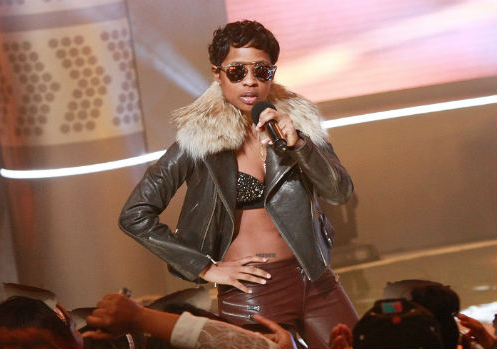This story first appeared in our 2016 Sports, Culture and Women in Hip Hop Issue, on newsstands now featuring our Yo Gotti and Hip Hop & Hollywood covers.
Ready or not, here they come. Meet the lady MCs coming straight from the heartland.
The streets are talking. Welcome a swift wave of rising femcees, bursting with unexampled flair and a dedicated following, as leaders of the new school in the heart of it all, the Midwest.
Enter a league ripe with female heavy hitters, grounded in the region’s rap meccas, Chicago and Detroit. Originating from locales void of a signature sound, unlike their East Coast (raw, edgy), West Coast (gangsta, G-Funk) and Southern (hype, celebratory) counterparts, isn’t necessarily a disadvantage. Dating back to the mid-90s, artists like Da Brat and Shawnna trailblazed a golden groove to Hip Hop glory in the Windy City, now home to an unsung assortment of lyricists rising to undisputed dominance.
With a respect-first-ask-questions-later attitude, the megacity, home to the first Black President, and lately, police corruption and growing gang violence, is no longer exclusive to boys-only, as the city of broad shoulders salutes a slew of female head hunters, whose dope demeanors and intimidating lyrics could stand bar-to-bar with their male peers.
In Chicago, Drill music reigns supreme. This is one of Hip Hop’s subculture love children, in all its street-rooted, abrasive glory. The unforgiving streets of Chicago a.k.a “Drillinois,” with pockets on the city’s south and west sides, are plagued with glorified violence where the bullets are as swift as Lake Michigan’s wind. Interscope Records artist Dreezy sets the record straight in regards to her own music perpetuating the violence. “I wouldn’t say [my music] promotes violence, but I talk about violence in my music. I do ‘turnt up’ music and it’s based more so on energy than violence. My song, ‘Ain’t For None’ is for somebody who’s not gonna have it, whether at work or on the streets. Some people say it promotes gang violence, but it’s real life, it’s not all happy-go-lucky.”
Whether her tracks contain dangerous lyrics or not, the 21-year-old “doesn’t condone people just walking up on somebody and shooting. I don’t condone violence anyway, but in certain situations I understand with every action there’s a reaction and people rap about it,” the “Serena” singer expresses plainly. “It’s not necessarily right or wrong, and I’m not necessarily telling you to go do it, you just got to have a strong mind set. It’s all about people’s mindset; people got weak mindsets. You got to learn how to enjoy a song sometimes.”
But is Chicago music too real, perpetuating gun violence, mirroring a real-life Call of Duty video game? Chella H, a.k.a. Jenny Low End, says absolutely. “In Chicago, so many young people see that you can get a lot of attention from making that type of music, so they gear towards it. Now you got a bunch of n*ggas rapping from every area trying to live up to what they talking about in the music.”
Chella, who’s prepping for her No Filter mixtape release, uses her music to escape childhood issues, straight no chaser, utilizing raunchy wordplay with a “raspy phone sex operator voice.” The “I’m Raw” raptress, who describes her tone as a “real bitch sound,” blasts Spike Lee’s controversial Chi-Raq movie. “I didn’t really understand the purpose [of it]. I was trying to give him the benefit of the doubt, but to make a movie called Chi-Raq and it don’t have nothing to do with what’s going on in Chicago is a lil’ weird. He kept saying, ‘It’s a war going on and y’all need to realize it’ but we do realize it! But what did you do to help? I feel like some people were picked as guinea pigs because you have to have a certain amount of residents to get the tax credit. I don’t feel like it shined a light on the war.”
Keeping the Drill movement lively, enter Katie Got Bandz. Battle tested. Street undertaker. Spitter. Her reality makes for rap junkie’s entertainment as a potent soundtrack for zoning and late night riding. On a mission to Drill-tastic dominance, the “Make Me Rich” mic controller hypnotizes with gutter proclamations and trunk heavy beats. Next to Katie stands Sasha Go Hard, a name that defines itself. Living up to her name, Sasha’s a musical drill sergeant with her daunting delivery on mentally assaulting tracks “Bricks” and “Girl Code.”
What makes the Chi, known for its style and trendy lingo (including “THOT,” now an urban vocabulary mainstay) so special is its arsenal of versatility. Timbaland’s protégé, Tink, who effortlessly seesaws between genres, is a true example of craftiness. Prolific as she is precocious, Tink wildly satisfies, magnifying social issues with a splintering authority. Surging with a honeyed finesse and unquenchable hunger to put Chicago back on the map, Tink is hoping to answer the call for the city’s redemption.
280 miles east of the Windy City lies Detroit, a flourishing metropolis flooding with talent. D-town’s finest, Dej Loaf, may be small in frame, but titanic in mainstream appeal, morphing into a radio mainstay with catchy tracks “Back Up” and break out smash, “Try Me.” Equipped with a high-pitched, childlike tone and the baby face to match, the Motor City native is ambitious as ambiguous. This reformed town on the brink of salvation is also home to Kash Doll, a stacked stallion on the rise, seducing listeners with her brash boss anthems on her debut album, Keisha vs. Kash Doll.
Breaking municipal limits and glass ceilings, the ladies of the Midwest are on Mission: Possible. These female MCs north of the Mason-Dixon line pose a problem to the rest of the country, reminding Hip Hop heads not to sleep on the flourishing few. These powerhouses may not ask for attention, but they’re consistently proving they don’t have to. The Midwest is playing by a different set of rules: their own.



